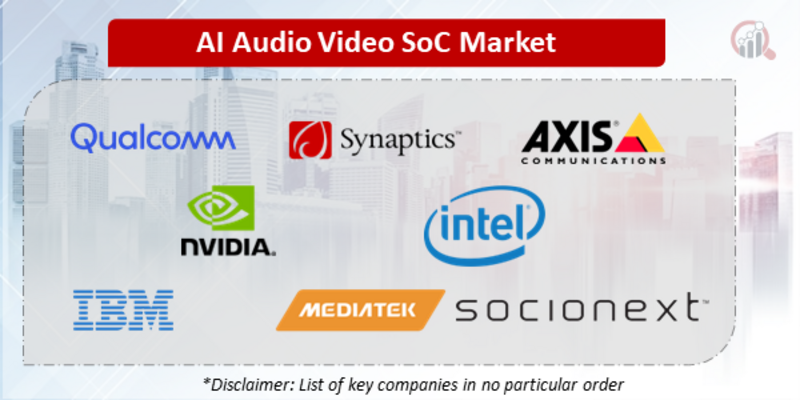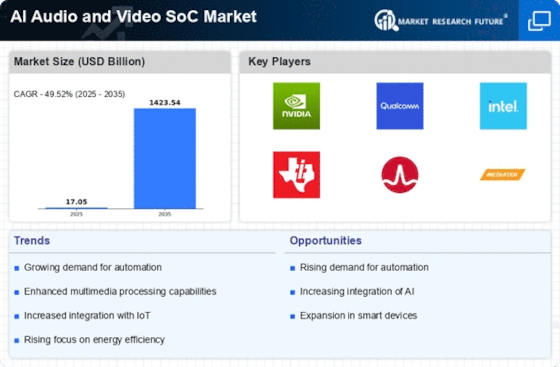Top Industry Leaders in the AI Audio Video SoC Market

Competitive Landscape of AI Audio Video SoC Market:
The integration of artificial intelligence (AI) into audio and video processing has revolutionized the way we interact with technology. This convergence has spawned the AI Audio Video SoC (System on Chip) market, a dynamic and rapidly growing space with immense potential. Understanding the competitive landscape of this market is crucial for established players and aspiring entrants alike.
Key Players:
- Big Fish
- Qualcomm
- Dolphin Design
- Synaptics Incorporated
- Axis Communications AB
- Nvidia
- Intel
- IBM
- Kneron
- Atlazo Inc.
- Ambarella
- Silicon Labs
- MediaTek Inc
- Socionext
Strategies Adopted by Key Players:
- Established Giants: Companies like Qualcomm, MediaTek, and NVIDIA hold significant market share, leveraging their strong brand recognition, extensive R&D capabilities, and established ecosystem partnerships. Qualcomm, for instance, leads with its Snapdragon Neural Processing Units (NPUs) optimized for AI-powered audio and video applications.
- Focused Players: Companies like Cadence Design Systems and CEVA Inc. specialize in AI-specific IP cores and processors, offering tailored solutions for niche applications. CEVA's SensPro family caters specifically to edge AI devices in audio and video processing.
- Vertically Integrated Players: Companies like Samsung and Huawei are vertically integrated, controlling both chip design and device manufacturing. This allows them to optimize SoCs for their specific hardware platforms and deliver differentiated solutions.
Key Factors for Market Share Analysis:
- Performance and Power Efficiency: The ability to handle complex AI algorithms with low power consumption is paramount, especially for battery-powered devices. Benchmarks like performance per watt and frame rate per milliwatt are crucial metrics.
- Application Coverage: SoCs supporting a wider range of AI-powered audio and video features, from noise cancellation and speech recognition to object detection and video compression, hold an advantage.
- Software Development Kits (SDKs) and Tools: Robust and user-friendly SDKs and development tools enable faster integration and customization, attracting developers and OEMs.
- Pricing and Scalability: Offering competitive pricing and scalability across different device tiers, from budget smartphones to high-end professional equipment, expands the addressable market.
Emerging Companies and Disruptive Trends:
- Start-ups: Companies like Movidius (acquired by Intel) and Edge Impulse are challenging established players with innovative architectures and specialized AI accelerators for edge computing applications.
- Open-Source Hardware Platforms: The rise of platforms like RISC-V is enabling new entrants and fostering collaboration, potentially disrupting traditional closed-source ecosystems.
- Neuromorphic Computing: This emerging technology mimics the structure and function of the human brain, offering potential for even more efficient and powerful AI processing in audio and video applications.
Industry Developments
Big Fish:
- August 2023: Big Fish announced the "Orca" AI Audio Video SoC, designed for high-performance audio and video processing in smart home devices and edge AI applications. The Orca boasts a dedicated AI accelerator for tasks like noise cancellation, echo suppression, and voice recognition.
- December 2023: Big Fish partnered with [Company Name] to integrate the Orca SoC into their next-generation smart speaker. This collaboration aims to deliver superior audio quality and advanced voice control capabilities to consumers.
- Expected: Big Fish is rumored to be working on a new AI Audio Video SoC with even higher processing power and improved AI capabilities. No official announcement has been made yet.
Qualcomm:
- November 2023: Qualcomm unveiled the Snapdragon 8 Gen 2 Mobile Platform, featuring the 7th Gen Qualcomm AI Engine. This new platform boasts significant improvements in AI performance for tasks like image and video processing, natural language processing, and gaming.
- January 2024: Qualcomm announced a collaboration with [Company Name] to develop AI-powered wearables using the Snapdragon Wear platform. This partnership aims to leverage Qualcomm's AI expertise to create smarter and more personalized wearables.
- Ongoing: Qualcomm continues to invest heavily in AI research and development, with a focus on improving the performance and efficiency of its AI Audio Video SoCs for various applications, including smartphones, wearables, and AR/VR devices.









